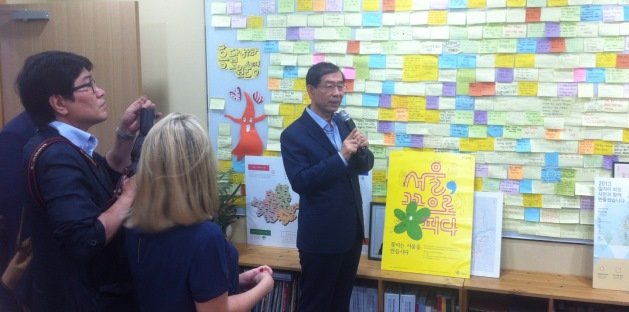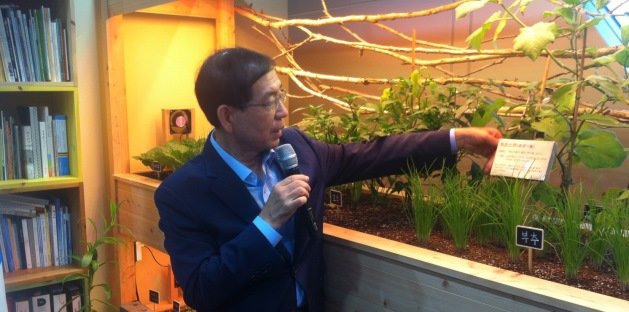Guest blog by: Renjie Butalid [1]
Overpopulation and urbanization have led to an increase in social issues such as housing, transportation, parking shortages, pollution, and resources overuse to name a few. And although many cities and municipalities across the board face similar issues, the complexities of these social issues are further amplified in the largest cities in the world given their population density. With a population of 10 million people living within a 234 square mile radius, Seoul, the largest city in South Korea, is included in this list.
I visited Seoul for the first time in September when I attended the Social Innovation Exchange (SIX) Summer School 2013, convened and hosted by Mayor Park Won-soon and the Seoul Metropolitan Government, in partnership with The Hope Institute. The theme of the conference was on reshaping our cities and making them thrive. A highly relevant topic given that more people are living in cities than ever before, where the cities we live in are growing rapidly.
The mayors of the world’s 25 largest cities are each responsible for more people than national prime ministers and presidents. The sustainability and resilience of our cities are therefore increasingly at the centre of the agenda for governments, policy makers, NGOs and corporations responsible for urban development.
At the helm of Seoul’s transformation towards becoming the next great sharing city as a response to the complex social challenges the city faces, is Mayor Park Won-soon, elected to the mayor’s office in October 2011 under the campaign slogan, “Citizens are the Mayor.”
Mayor Park Won-soon has a demonstrated track record of social activism and innovative problem-solving, having built a career as a political activist, community organizer, human rights lawyer, professor, and social entrepreneur.
In the Summer 2013 edition of the Stanford Social Innovation Review, Mayor Park Won-soon outlined his multi-sector collaborative approach to problem-solving: embracing the sharing economy. This model to combat pressing social issues facing the city fosters cross-sector innovations between government, the market, and civil society organizations based on true cooperation and collaboration, while also fostering social enterprises that use innovative approaches to tackling social problems.
An example of this cross-sector collaborative approach is the formation of the Seoul Social Innovation Park, located in the north part of the city and housed on a campus that was formerly the Korea National Institute of Health. The Seoul Social Innovation Park is home to a cluster of organizations and shared spaces for the development of social enterprises, and includes the Seoul Social Economy Centre, Seoul Community Support Centre, Seoul Creative Lab and The Youth Hub.
Mayor Park Won-soon has created a culture of listening and soliciting input from citizens, involving them in the decision-making process in a meaningful way. Mayor Park Won-soon has taken this culture to heart with his placement of an illustration of a large ear greeting those who enter the newly built Seoul City Hall.
Mayor Park Won-soon standing in front of a wall of post-it notes received from citizens from a town hall meeting. Each post-it note contains one recommendation on how to improve the city. Location: Mayor’s Office, Seoul City Hall, Seoul, South Korea, September 2013)

Some examples that exemplify this listening culture, include:
- the Simincheong, a “speakers corner” located in Seoul City Hall where anyone who wants to send a video message to the city administration can do so — the video can be up to 10 minutes long and is broadcasted on the Seoul City website;
- the Seoul City 2.0 campaign for the spread of transparent information and communication to Seoul citizens on city government operations;
- the Seoul Plan Citizen Participators, an organization that involves citizens in Seoul’s urban planning initiative “Seoul 2030.”;
- and the Residents’ Participatory Budgeting System, a citizen-participatory budget plan that allows citizens to secure 50 billion won (roughly $47 million) in 2013 for projects of their choosing;
The establishment of the Seoul Innovation Planning Division is another key component in Mayor Park Won-soon’s approach towards increasing citizen participation in city building. The Division is responsible for collecting examples of innovation from around the world and researching how they may be applied in Seoul, while also gathering ideas from Seoul citizens and then working to spread and apply those ideas across the city.
When one of the world’s largest cities with a population of 10 million is led by a visionary who creates the space and provides opportunities to engage citizens directly — while creating agency within government divisions to cut through bureaucracy and get things done — cross-sector innovations may just occur that betters the lives of Seoul citizens while also maximizing the city’s resources and budget.
In a few short years, Seoul City and its culture of open dialogue with citizens, and meaningful cooperation and collaboration across sectors, could become one of the greatest, if not the greatest sharing city in the world.

Mayor Park Won-soon discussing the growth of rooftop urban farms across the city of Seoul. Location: Mayor’s Office, Seoul City Hall, Seoul, South Korea, September 2013)
1. Renjie Butalid is an entrepreneur with a passion for social change. He currently leads socialsca.pe, the global social good mapping project incubated at Igniter in partnership with the J.W. McConnell Family Foundation, MaRS, Ashoka and CatalystsX. Renjie attended the SIX Summer School 2013 in Seoul as part of the Canadian delegation, where he also led a mapathon workshop on global social innovation. Renjie is part of the World Economic Forum; (WEF) Global Shapers and was previously a TEDx organizer and startup co-founder